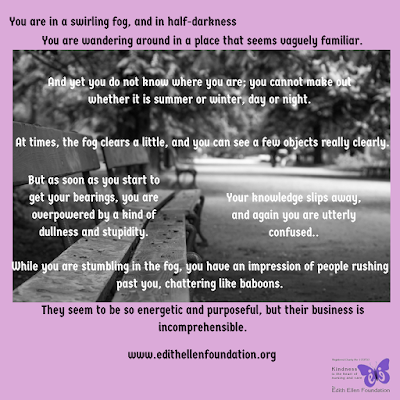I regularly have books
recommended to me and because people have taken the time to contact me and do so I try to read as many as I can.
I have
just finished reading a book which was recommended to me by one of my followers
on Twitter – who felt strongly that it would be a benefit to me and my own
condition. Written by Tom Kitwood
‘Dementia
Reconsidered: The Person Comes First’ Tom says that after ‘spending time in
settings that epitomised the old culture of care, with it malignant social
psychology and pervasive neglect, I attempted to express, imaginatively,
something of what the experience of unattended dementia might be like’.
Tom Kitwoods words really resonated with me. I genuinely feel like a better person since reading this book Dementia
Reconsidered: the Person Comes First
It is
this excerpt that I wanted to share with you because I truly feel that for anyone
working in the Health & Social Care Sector and particularly with Dementia Patients it will give
them a whole new understanding of the person within.
You are in a swirling fog, and in
half-darkness.
You are wandering around in a place that seems
vaguely familiar.
And yet you do not know where you are; you
cannot make out whether it is summer or winter, day or night.
At times, the fog clears a little, and you can
see a few objects really clearly.
But as soon as you start to get your bearings,
you are overpowered by a kind of dullness and stupidity.
Your knowledge slips away, and again you are
utterly confused.
While you are stumbling in the fog, you have an
impression of people rushing past you, chattering like baboons.
They seem to be so energetic and purposeful,
but their business is incomprehensible.
Occasionally you pick up fragments of
conversation, and have the impression that they are talking about you.
Sometimes you catch sight of a familiar face.
But as you move towards the face it vanishes, and
turns into a demon.
You feel desperately lost, alone, bewildered,
frightened.
In this dreadful state, you find that you cannot control your bladder, or your bowels.
You are completely losing your grip; you feel
dirty, guilty, and ashamed.
It’s so unlike how you used to be, that you
don’t even know yourself.
And then there are the interrogations.
Official people ask you to perform strange tasks which you cannot fully understand: such as counting backwards from one hundred, or obeying the instruction: 'If you are over 50, put your hands above your head'.
You are never told the purpose or the results
of these interrogations.
You’d be willing to help, eager to co-operate,
if only you knew what it was all about, and if someone took you seriously
enough to guide you.
This is the present reality: everything is falling apart, nothing gets completed, and nothing makes sense.
But worst of all, you know it wasn’t always
like this.
Behind the fog and the darkness there is a
vague memory of good times, when you knew where and who you were, when you felt
close to others, and when you were able to perform daily tasks with skill and
grace; once the sun shone brightly and the landscape of life had richness and
pattern.
But now all that has been vandalised, ruined,
and you are left in chaos, carrying the terrible sense of a loss that can never
be made good.
Once you were a person who counted.
Now you are a nothing, and good for nothing.
A sense of oppression hangs over you,
intensifying at times into naked terror.
Its meaning is that you might be abandoned for
ever, left to rot and disintegrate into unbeing.


No comments:
Post a Comment